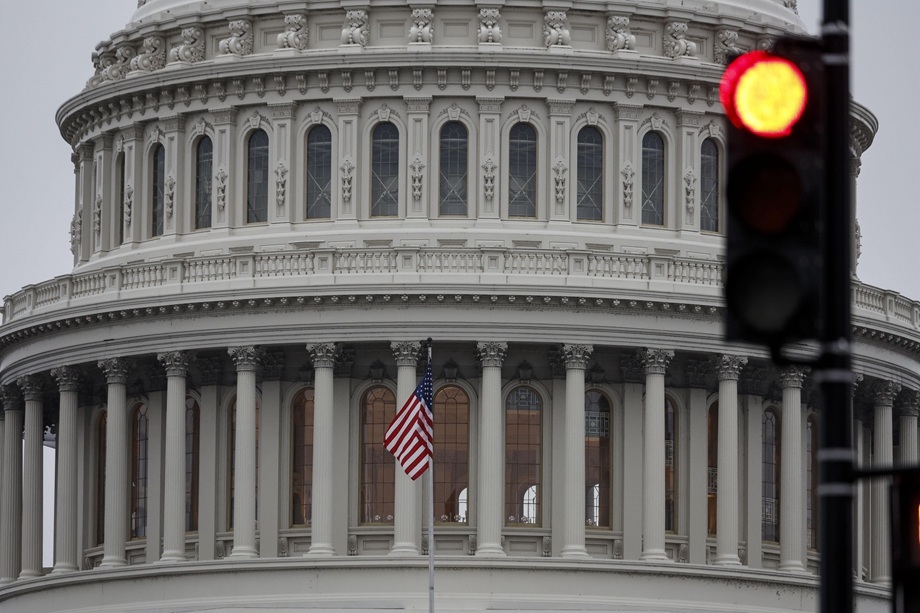US is a threat to multilateral trading regimes

An American flag flies outside of the U.S. Capitol dome in Washington, United States. [Photo/Xinhua]
Protecting the sanctity of key multilateral trading forums, such as the World Trade Organization (WTO), is becoming increasingly important to support a free and non-discriminatory market environment. For this reason, it is a principled stance from scores of member states, including China, to call out federal U.S. legislation that comes across as problematic, suppressive, and discriminatory in the context of multilateral trading regimes. "Competition should be fair and rational," recently cautioned the Chinese Foreign Ministry. "Suppressing or taking away other countries' right to development through unilateralism and protectionism is both unjustified and goes against market rules and economic laws."
It is true that a major barrier to the realization of the WTO's non-discrimination principle is the U.S.'s dependence on unilateral and protectionist policies. From unwarranted trade tariffs and punitive export controls to anti-competitive provisions of the Inflation Reduction Act, there is a pattern to what China called "walls and barriers" set up by the U.S., which "severely disrupted global industrial and supply chains."
Fears of the WTO being used as a weapon against legitimate business interests are also at the heart of current fissures between South Korea, the EU, and the U.S. The former two are keen to utilize the WTO's dispute-settlement mechanism, which the U.S. has brazenly undermined in the past. All this underlines the need for the urgent accountability of market violations through reformed multilateral trading regimes, as championed by Beijing. Refusing U.S. exceptionalism is also critical to the cause of a free, non-discriminatory, and truly representative trading system.
Growing criticism of Washington's unilateral trade practices has a strong basis. For instance, the EU is rising up to Washington's use of discriminatory subsidies and taxes as levers against its businesses. This tacit resistance to future bullying was substantiated by the Executive Vice President of the European Commission last week. Moreover, by rightly pointing to Washington's emergence as a major threat factor to global economic stability, Beijing demonstrates ample concern for the development rights of all trading states worldwide. If the U.S. attempts to influence the very principles that guarantee a level-playing field for developing and emerging economies, it is a recipe for broad-based pushback.
There is no doubt that the world could use credible reforms within the WTO. It is key to cultivating a broader movement that allows more developing world voices in multilateral trade arrangements, as opposed to a self-identified "rules-based order" that prioritizes containment and aims to pull the plug on diverse, critical voices. Many emerging economies are already facing headwinds this year in terms of growth, investment, and lucrative trade. These make it unsustainable for more U.S. anti-competitive practices to come to the fore and willingly disrupt level-playing stakes for all.
At the same time, critical reception of Washington's China-focused "friend-shoring" strategy has brought U.S. exploitation of critical supply chains under further scrutiny. Either way, Washington's actions under multilateral trading regimes identify as threat multipliers, and many allies are waking up to this reality.
Brussels' own patience is also wearing thin. After all, there is no sizeable buy-in for discriminatory U.S. laws such as the U.S. Chips and Science Act and the highly contested Inflation Reduction Act. Both borrow from the same brand of populist and self-serving "America first" ideology that hopes to plug American manufacturing decline at home in an untenable way – by targeting the development and innovation interests of free market players abroad. So, persisting with such a trajectory will accomplish what the U.S. has refused to admit on the world stage: That it has been found to be a rule-breaker at the WTO.
True proponents of a free and fair trade order offer hope. As recently as September last year, China voiced its willingness to engage with major economies constituting the Group of 20 (G20), to bring tangible reforms to light. As the U.S. puts more distance between WTO trade principles and its protectionist policies against overseas markets, China strives to promote organizational impartiality by recognizing the value of reform to all-out Sustainable Development Agenda progress.
That is the true interest of the world at large, rather than expecting others to own up to U.S. unilateralism in full.
(The writer Hannan R. Hussain is a foreign affairs commentator, author and recipient of the Fulbright Award.)








